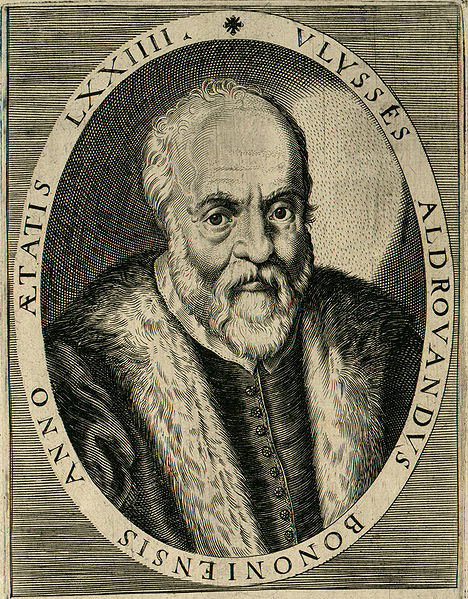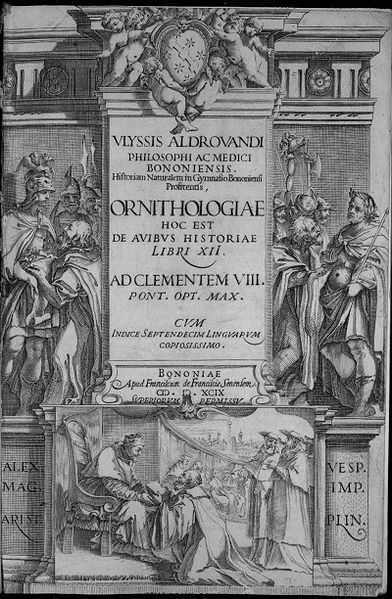<Back to Index>
- Naturalist Ulisse Aldrovandi, 1522
- Novelist David Herbert Richards Lawrence, 1885
- President of the Philippines Ferdinand Emmanuel Edralin Marcos, 1917


Ulisse Aldrovandi (11 September 1522 – 4 May 1605) was an Italian naturalist, the moving force behind Bologna's botanical garden, one of the first in Europe. Carolus Linnaeus and the comte de Buffon reckoned him the father of natural history studies. He is usually referred to, especially in older literature, as Aldrovandus; his name in Italian is equally given as Aldroandi.
Aldrovandi was born in Bologna to a noble family, which sent him to apprentice with merchants, but he found his vocation, after studying humanities and law at the universities of Bologna and Padua and becoming a notary. Successively his interests went out to philosophy and logic which he combined with the study of medicine.
He obtained a degree in medicine and philosophy in 1553 and started teaching logic and philosophy in 1554 at the University of Bologna. In 1559 he became professor of philosophy and in 1561 he became the first professor of natural sciences at Bologna (lectura philosophiae naturalis ordinaria de fossilibus, plantis et animalibus).
In June of 1549 he was accused and arrested for heresy, for espousing the anti-trinitarian beliefs of the Anabaptist Camillo Renato. By September he had published an abjuration, but was transferred to Rome, and remained in custody or house arrest till absolved in April 1550. During this time he befriended many local scholars. While in semi-captivity there he became more and more interested in botany, zoology and geology (apparently he can be credited for the invention/first written record of this word). From 1551 onward, he organized a variety of expeditions to the Italian mountains, countryside, islands, and coasts in order to collect and catalogue plants.
In the course of his life he would assemble one of the most spectacular cabinets of curiosities, his "theatre" illuminating natural history comprising some 7000 specimens of the diversità di cose naturali, of which he wrote a description in 1595. Between 1551 and 1554 he organised several expeditions to collect plants for a herbarium, among the first botanizing expeditions. Eventually his herbarium contained about 4760 dried specimens on 4117 sheets in sixteen volumes, preserved at the University of Bologna. He also had various artists, including Jacopo Ligozzi, Giovanni Neri, and Cornelio Schwindt, make illustrations of specimens.
At his demand and under his direction a public botanic garden was created in Bologna in 1568, now the Orto Botanico dell' Università di Bologna. Due to a dispute on the composition of a popular medicine with the pharmacists and doctors of Bologna in 1575 he was suspended from all public positions for five years. In 1577 he sought the aid of pope Gregory XIII (a cousin of his mother) who wrote to the authorities of Bologna to reinstate Aldrovandi in his public offices and request financial aid to help him publish his books.
His vast collections in botany and zoology he willed to the Senate of Bologna; until 1742 the collections were conserved in the Palazzo Pubblico, then in the Palazzo Poggi, but were distributed among various libraries and institutions in the course of the nineteenth century. In 1907 a representative part were reunited at Palazzo Poggi, Bologna, where the 400th anniversary of his death was memorialized in a celebrative exhibition in 2005.